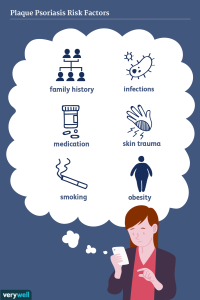Understanding Psoriasis: Causes, Symptoms, Risk Factors, and How Ayurveda Can Help in Controlling It
What is Psoriasis?
An autoimmune condition called psoriasis causes the skin’s cell turnover rate to increase. In roughly 28 to 30 days, skin cells die and are replaced by new ones during a typical skin cycle. But with psoriasis, this process takes place in a matter of days, resulting in the accumulation of cells on the skin’s surface. Thick, silvery scales and dry, red patches that are uncomfortable and occasionally painful are formed by these extra skin cells.
Causes of Psoriasis

Although the precise etiology of psoriasis is still unknown, researchers think that a mix of environmental and hereditary variables have a role in the condition:
Factors related to
- Genetics: Psoriasis often runs in families. You can be more susceptible to psoriasis if you have a parent or sibling who has it.
- Immune System Dysfunction: Because psoriasis is an autoimmune condition, healthy skin cells are mistakenly attacked by the immune system. This triggers an inflammatory reaction that accelerates the synthesis of skin cells.
- Environmental Triggers: A number of environmental variables, such as infections, stress, weather, smoking, excessive alcohol use, and certain drugs, can cause or worsen psoriasis.
Symptoms of Psoriasis

The symptoms of psoriasis can vary depending on the type of psoriasis, but common symptoms include: Psoriasis symptoms
Depending on the type, psoriasis can have a variety of symptoms, but typical ones include:
• Red, swollen skin areas: These areas frequently have silvery scales covering them.
• Dry, cracked skin: In certain situations, the skin may break and bleed.
• Soreness, burning, or itching: These spots may be extremely painful or uncomfortable.
• Thicker or ridged nails: Psoriasis can cause the nails to separate from the nail bed, pit, or become discolored.
• Swollen or stiff joints: Psoriatic arthritis, in which the joints become inflamed, can occasionally result from psoriasis.
Risk Factors for Psoriasis

Several factors increase the risk of developing psoriasis, including:
- Family History: As previously stated, your risk is increased if you have a family member who has psoriasis.
2. Age: Although psoriasis can strike anyone at any age, it usually manifests between the ages of 15 and 35.
3. Infection: For certain people, certain diseases, such as strep throat, can cause or exacerbate psoriasis.
4. Weather: While warm, sunny places may provide some relief from psoriasis, cold, dry weather can exacerbate the condition.
5. Stress: Psoriasis flare-ups can be brought on by emotional or physical stress.
6. Obesity: Being overweight raises the risk of psoriasis, particularly in places like the groin or armpits where skin rubs against one another.
7. Alcohol and Smoking: Excessive alcohol intake and smoking are associated with a higher risk of psoriasis flare-ups.
How Ayurveda Can Help in Controlling Psoriasis
Ayurveda, the ancient system of medicine from India, takes a holistic approach to treating diseases, including psoriasis. It focuses on balancing the three doshas (Vata, Pitta, and Kapha) in the body to maintain overall health. Ayurveda views psoriasis as a result of an imbalance in the body’s internal energies, often due to the accumulation of toxins (ama) and an imbalance of the Pitta dosha (which governs the body’s heat and inflammation).
Here’s how Ayurveda can help control and manage psoriasis:
-
Herbal Remedies
Ayurveda uses a variety of herbs that are known to have anti-inflammatory and skin-healing properties. Some commonly used herbs include:
The ancient Indian medical method known as Ayurveda treats psoriasis and other illnesses holistically. In order to preserve general health, it emphasizes harmonizing the body’s three doshas—Pitta, Kapha, and Vata. Psoriasis, according to Ayurveda, is caused by an imbalance in the body’s internal energies, frequently as a result of the buildup of toxins (ama) and an imbalance of the Pitta dosha, which controls inflammation and body heat.
Ayurveda can help treat and control psoriasis in the following ways:
1. Herbal Treatments
Numerous herbs with anti-inflammatory and skin-healing qualities are used in Ayurveda. Among the often utilized herbs are:
- Turmeric: Known for its powerful anti-inflammatory properties, turmeric can help reduce the inflammation associated with psoriasis.

- Neem: This herb has antibacterial and antifungal properties, helping to cleanse the skin and alleviate itching.
- Aloe Vera: Aloe vera gel can be applied directly to the skin to soothe irritation and reduce inflammation.
- Brahmi: Known to calm the mind and reduce stress, Brahmi can help manage the emotional triggers of psoriasis.
-
Dietary Changes
Ayurveda emphasizes the importance of diet in maintaining balance in the body. For psoriasis, the following dietary changes may help:
-
Turmeric:
Well-known for its potent anti-inflammatory qualities, turmeric can aid in lowering psoriasis-related inflammation.
• Neem:
This herb helps to cleanse the skin and reduce irritation because it has antibacterial and antifungal qualities.
• Aloe Vera:
To relieve irritation and lower inflammation, apply aloe vera gel straight to the skin.
• Brahmi:
Known for lowering stress and calming the mind, Brahmi can assist in controlling the emotional triggers that cause psoriasis.
-
Modifications to Diet
Ayurveda places a strong emphasis on the role nutrition plays in preserving bodily equilibrium. The following dietary adjustments may be beneficial for psoriasis:
Steer clear of foods that aggravate pitta, such as fried, spicy, and acidic foods, as they can raise body temperature and inflammation.
• Including foods that are cooling and calming: Whole grains, fresh fruits, and vegetables can help regulate Pitta and lessen inflammation in the skin.
• Hydration: Toxins can be eliminated and the skin kept moisturized by consuming lots of water and herbal teas (such as mint or chamomile).
-
Panchakarma, or detoxification
Panchakarma is a cleansing method used in Ayurveda to rid the body of accumulated poisons. This may be a crucial component of psoriasis treatment. Typical Panchakarma remedies include:
- Abhyanga (Oil Massage): This relaxing technique can help increase blood flow, nourish the skin, and lessen the visibility of scales.
• Virechana (Purgation): By causing a controlled purging, this procedure aids in ridding the body of surplus poisons.
• Shirodhara: A relaxing and stress-relieving therapy in which warm oil is applied to the forehead.
- Handling Stress
Given that psoriasis flare-ups are known to be triggered by stress, Ayurveda stresses the significance of stress management techniques like:
- Meditation: Meditation on a regular basis can help control psoriasis’s emotional triggers, lower anxiety, and relax the mind.
- • Yoga: Some yoga poses aid in stress relief, circulation improvement, and inflammation reduction.
- Lifestyle Modifications• Getting enough sleep is essential for the body’s regeneration and healing.• Preventing Overheating: Hot, muggy weather can aggravate psoriasis. Avoiding excessive heat, both inwardly and externally, is advised by Ayurveda.• Frequent Exercise: Blood circulation is enhanced and dosha equilibrium is aided by moderate physical activity
You can visit our Youtube channel to get knowledge about other Products.
To get more information click here

